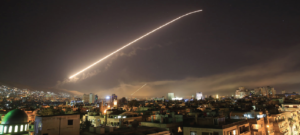
American missiles target Damascus, Syria in retaliation for President Baharal-Assad’s chemical attack on the citizens of Douma.
On April 7, a chemical attack on the Syrian region of Douma left more than seventy civilians dead. On April 12, after an intense seven-week offensive, the Syrian army regained control over the area which had been held by rebel forces since the civil war broke out in 2011. As the last remaining rebel-stronghold near the nation’s capital, Damascus, Douma has been targeted by intense government bombardment over the past three months, destroying over forty percent of the city and forcing its 200,000 inhabitants to retreat underground. In January, Iraqi-lead coalition forces reclaimed Mosul after three years under brutal Islamic State occupation. Since then, Syria has witnessed heightened levels of conflict between pro-Assad forces and rebel groups; in February, Eastern Ghouta—in which Douma is the largest municipality—was attacked relentlessly by some of the worst air assaults in the civil war’s seven years.
After horrific images of the attacks’ aftermath swept the internet, the matter of chemical weapons in Syria has come to occupy the front page of every major news outlet. In a rare criticism of Russia, President Donald Trump P’00 eagerly joined other leaders in condemning the Assad regime for using chemical weapons against citizens. Although the President is known for empty threats, these ones proved to be legitimate when the US, Britain, and France ordered 110 missiles against the Syrian government. This was the second airstrike the Trump Administration has conducted in retaliation against the Assad regime. The President stated: “I ordered the United States armed forces to launch precision strikes on targets associated with the chemical weapon capabilities of Syrian dictator Bashar al-Assad.”
Although Mr. Trump released the tweet “Mission Accomplished!” after Defense Department officials confirmed that the strikes had landed, this act of interference doesn’t bode well for the US. Since the country erupted into internal turmoil in 2011, Syria has been transformed into a free-for-all battleground in which regional and foreign players can pursue their national interest. Yet, this was the seventeenth documented time that the Assad regime has used chemical weapons since 2013. Other attacks have amassed attention, but what is different about the attacks in Douma that elicited such an intense reaction from the international community? It has nothing to do with body counts, or that children were targeted; Mr. Trump is certainly not motivated by moral or humanitarian imperatives.
Even though both the chemical attack and the airstrikes complicate international relations, it would be foolish of the US to insert itself into Syria any further than it already has. It is tried and true that America cannot police the Middle East. Secondly, airstrikes are not going to be an effective deterrent against Assad. If nothing else, the regime has demonstrated that it is willing to put its citizens in harm’s way. While showy feats of military interference are U.S. convention, there is no chance that a ruler that has stayed in power despite being challenged on every possible level—including by the Islamic State—would be brought down because of retaliatory missile strikes.
This conflict has endured for eight chaotic years: if it has any chance of coming to a close, it is not going to be with convenient tactics and feeble policy. For the sake of the innumerable Syrian lives, families, and communities that have been left behind or devastated, we must recognize that hawkish and ill-deliberated military gestures have nothing to do with “spreading democracy.” Each time civilians in Syria, Iraq, Afghanistan, or Yemen are killed by American-backed airstrikes it becomes increasingly difficult to distinguish between the tyranny our nation represents and the tyranny we fight in continual war. The dead are no more or less dead whether their murders come by way of Syrian, American, or Russian arms. Foreign powers must put aside their own national interests in Syria if there is to be any end in sight to the bloodshed between government and opposition forces.
At its core, the Syrian Civil War was born out of the ideals of democracy and representation. If America’s actions on the international level undermine the same principles it presumes to champion then it does so in dishonor of all the many lives that have been sacrificed for the promise of freedom.




